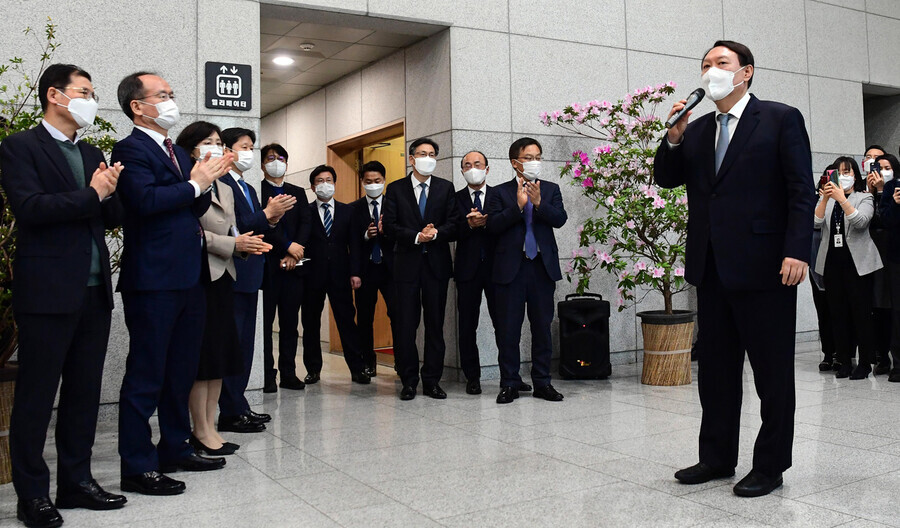hankyoreh
Links to other country sites 다른 나라 사이트 링크
[Editorial] Yoon’s political ambitious could radically undermine neutrality of prosecution

South Korean Prosecutor General Yoon Seok-youl abruptly tendered his resignation Thursday. President Moon Jae-in accepted Yoon’s resignation, as well as the pending resignation of Senior Presidential Secretary for Civil Affairs Shin Hyun-soo, who had bickered with Justice Minister Park Beom-kye over appointments for the prosecution service.
The reason Yoon offered for resigning is the ruling Democratic Party’s effort to set up a new agency for investigating serious crimes, which is part of a push to completely separate the powers of investigation and indictment.
“The spirit of the constitution and the rule of law, systems that have sustained our government, are being destroyed,” Yoon said.
However, Yoon’s impression does not correspond to reality — and even if it did, it wouldn’t give the prosecutor general cause to resign before the end of his term. The assumption that Yoon intends to run for president is extremely troubling, since it could radically undermine the neutrality of the prosecution service.
South Korean society has long struggled with the problems caused by the prosecution service’s monopolization of the powers of investigation and indictment. That’s a problem that even Yoon himself agrees must ultimately be resolved through the separation of those powers.
The question of how to improve those systems is up to the legislative branch to decide, following a discussion in society. Furthermore, the discussion about separating the powers of investigation and indictment is only now beginning. That discussion is also open to members of the prosecution, who can express their opinions through normal procedures.
Since the ruling party has promised to give the opinions of the prosecution service a thorough hearing, the prosecutor general’s explanation for his resignation doesn’t seem very convincing. The circumstances surrounding Yoon’s resignation raise suspicions that he was motivated by political calculations.
“I will continue doing my best to protect liberal democracy and the people as I always have, no matter where I am,” Yoon said. These remarks are taken as a de facto, though not direct, declaration that he means to launch a political career.
Yoon publicly declared his resignation just two days after attracting attention with an interview with the press, an unusual step for a prosecutor general. The day before his resignation, he visited Daegu, a key base of support for the opposition People Power Party.
That certainly looks like the kind of thing a wily politician would do. It’s tough to shake the suspicion that Yoon put the spotlight on the debate over separating the powers of investigation and indictment so that he could use that as a pretext for his resignation.
Yoon has stressed the political neutrality of the prosecution service, contending that “politically biased prosecutors represent a form of corruption.” For Yoon to step down in the middle of his term and jump into politics represents a contradiction of that stance.
It’s impossible to avoid suspicions that Yoon’s decisions as prosecutor general were influenced by political considerations, and the resulting political distrust will affect the future actions of the prosecution service. In fact, they deliver a fatal blow to the prosecutors’ credibility.
Setting aside the separation of the powers of investigation and indictment, we think that a major overhaul of the prosecution service is needed to ensure its political neutrality.
The ruling party should also humbly reflect upon the fact that it gave Yoon an excuse for resigning with its ham-fisted pursuit of prosecutorial reform, as well as the fact that the public has been exhausted by the ongoing feud. Prosecutorial reform is unlikely to succeed unless it’s based on public consensus. Resistance to reform should be dealt with sternly, but even more effort should be devoted to broadening public support.
We hope the Blue House will restore stability to the prosecution service by swiftly appointing a widely trusted figure as the next prosecutor general.
Please direct comments or questions to [english@hani.co.kr]

Editorial・opinion
![[Column] Life on our Trisolaris [Column] Life on our Trisolaris](https://flexible.img.hani.co.kr/flexible/normal/500/300/imgdb/original/2024/0505/4817148682278544.jpg) [Column] Life on our Trisolaris
[Column] Life on our Trisolaris![[Editorial] Penalties for airing allegations against Korea’s first lady endanger free press [Editorial] Penalties for airing allegations against Korea’s first lady endanger free press](https://flexible.img.hani.co.kr/flexible/normal/500/300/imgdb/original/2024/0502/1817146398095106.jpg) [Editorial] Penalties for airing allegations against Korea’s first lady endanger free press
[Editorial] Penalties for airing allegations against Korea’s first lady endanger free press- [Editorial] Yoon must halt procurement of SM-3 interceptor missiles
- [Guest essay] Maybe Korea’s rapid population decline is an opportunity, not a crisis
- [Column] Can Yoon steer diplomacy with Russia, China back on track?
- [Column] Season 2 of special prosecutor probe may be coming to Korea soon
- [Column] Park Geun-hye déjà vu in Yoon Suk-yeol
- [Editorial] New weight of N. Korea’s nuclear threats makes dialogue all the more urgent
- [Guest essay] The real reason Korea’s new right wants to dub Rhee a founding father
- [Column] ‘Choson’: Is it time we start referring to N. Korea in its own terms?
Most viewed articles
- 1New sex-ed guidelines forbid teaching about homosexuality
- 2OECD upgrades Korea’s growth forecast from 2.2% to 2.6%
- 360% of young Koreans see no need to have kids after marriage
- 4[Column] Life on our Trisolaris
- 5[Guest essay] Maybe Korea’s rapid population decline is an opportunity, not a crisis
- 6Months and months of overdue wages are pushing migrant workers in Korea into debt
- 7Presidential office warns of veto in response to opposition passing special counsel probe act
- 8Inside the law for a special counsel probe over a Korean Marine’s death
- 9Two lung cancer deaths at Samsung Electronics deemed occupational in nature
- 10Korean government’s compromise plan for medical reform swiftly rejected by doctors